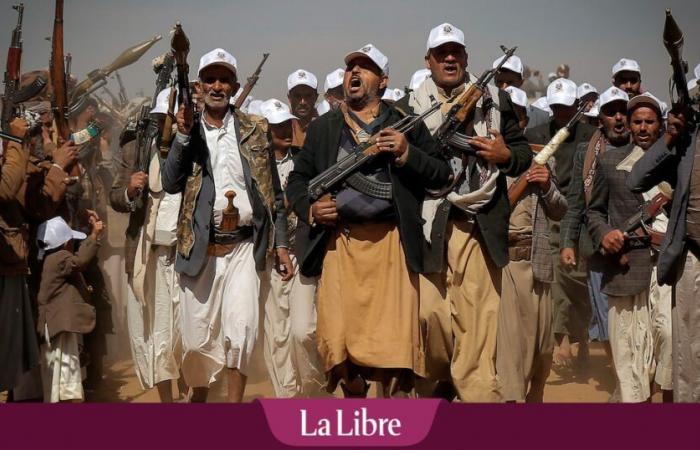The Houthis of Yemen, for their part, have gone through this year of war without suffering major setbacks. On the contrary, their attacks in the Red Sea significantly impacted global maritime trade for several months, and made this local group, long marginalized, an influential regional actor and one of the main defenders of the Palestinian cause. To the point of becoming Iran’s next strong ally?
A threat to Israel?
Convenient allies of Hamas, the Houthis were Iran’s first partner to fire a medium-range ballistic missile at Israel in November 2023 – an act that Iran itself had not yet resolved to do, after more than 40 years of opposition to Israel. Since the start of the conflict, the Yemeni militia has launched more than 200 cruise missiles and drones against Israeli territory, according to Israeli army data. Mostly sporadic and not very effective, these attacks nevertheless caused the death of a civilian in July 2024, killed by an explosion in the center of Tel Aviv.
After the launch of several Houthi ballistic missiles towards Israel in recent weeks, the IDF is now considering a “significant attack“against Yemen, a senior Israeli official told the public channel Kan 11 in early December.”I think that an Israeli intervention against the Houthis is possible, because for the moment Iran is struggling to protect its proxies“, estimates Pascal Ausseur, director general of the Mediterranean Foundation for Strategic Studies (Fmes) and former admiral of the French army. ““Now the Axis of Resistance is more or less the Iraqi Shiite militias and the Houthis, and Israel has shown that it wants to take advantage of this period of geopolitical vacuum.”
Weakened by Israel, Hezbollah must now deal with the fall of the Assad clan in Syria
Will these strikes really be effective? It’s hard not to mention the operation.Decisive storm“, launched by Saudi Arabia against the Houthis in 2015. A resounding military failure amounting to an inextricable quagmire for Riyadh, and having caused one of the worst humanitarian crises in the world. “Unlike Hezbollah or the Syrian or Iraqi Shiite militias, the Houthis have a tribal structure, very reticular and therefore more difficult to strike. They have a decentralized structure, the launch sites are very dispersed, so there is no nerve center to hit.” explains Mr. Ausseur.
The Iraqi priority
From then on, the Israelis could “rather threaten Iranian supplies arriving by sea” or “completely destroy their supply ports in order to break the flow of spare parts supply.” A strategy nevertheless voracious in ammunition and “disproportionate“according to Pascal Ausseur because”Tel Aviv does not see the Houthis as a priority threat“. Located more than 2,000 km from Israeli territory, the Houthi forces struggle to strike Israel effectively and their attacks in the Red Sea only slightly affect its economy.
Relatively independent on a military level, the Yemeni militia could nevertheless be told to keep a low profile by the Iranian godfather. It is in fact one of Iran’s last trump cards from now on.in a defensive posture“facing its regional enemies and for whom”the time is rather to maintain what can be maintained“. “I don’t see the Iranians going back on the counter-attack for the moment. Or give the Houthis the green light to carry out attacks against Israel, which would make them take risks for relatively little gain“, judges the Vice-Admiral of the squadron.
Syria: “A hegemonic movement like HTC can hardly envisage real political competition”
From now on, it would rather be for Tehran to “maintain as much as possible“its network of proxies in order to have”a bargaining chip at the time of potential negotiations“. But above all “ avoid the destabilization of Iraq at all costs“, bordering a Syria now led by a Salafist organization openly hostile to the Islamic Republic and its interests in the Middle East. And Pascal Ausseur concludes that “if a Sunni caliphate is established [à Damas] and regains power, it is possible that this will generate an echo in Iraq, where an entire Sunni population is ready to take up arms again against the Shiites“.






